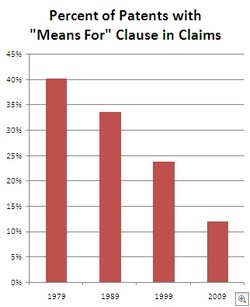 Statistics on the Use of Means Plus Function Language: Thus far in 2009 (1/1/2009 – 2/8/2009) the PTO has issued 17,206 patents. Of those, only 12% (2060) have a “means for” clause in the claim language. Looking back one decade, 24% of patents issued in January 1999 included a “means for” clause in the claim language. Looking back two decades, 34% of patents issued in January 1989 included a “means for” clause in the claim language. Looking back three decades, 40% of patents issued in January 1979 included a “means for” clause in the claim language.
Statistics on the Use of Means Plus Function Language: Thus far in 2009 (1/1/2009 – 2/8/2009) the PTO has issued 17,206 patents. Of those, only 12% (2060) have a “means for” clause in the claim language. Looking back one decade, 24% of patents issued in January 1999 included a “means for” clause in the claim language. Looking back two decades, 34% of patents issued in January 1989 included a “means for” clause in the claim language. Looking back three decades, 40% of patents issued in January 1979 included a “means for” clause in the claim language.- New Funny Blog: http://courtoons.wordpress.com/ by appellate attorney David Mills
- Watch The Symposium: The hardworking folks at Santa Clara’s Computer & High Technology Law Journal (CHTLJ) have posted materials and video from their conference two weeks ago. Those of you who have practiced before Judges Whyte or Ware will certainly enjoy the tribute video. [LINK] [The best portion begins at 11:20 in the Whyte video].
- PTO Transparancy: Readers submitted two additional suggestions for PTO Transparancy
-
- The PTO should calculate and publish the expiration date of each patent.
- The PTO should publish reexamination certificates so that they are searchable. [Via NIPPER]
No No Words: What Words do you Avoid in Patent Applications
I'm planning to do a quick study of "no no words" in patent applications and how their use has changed over time. Examples include "objects of the invention," the "present invention," "must," "prior art," "limitation," ...
Inter Partes Reexamination Estoppel and ITC Proceedings
One knock against the inter partes reexamination system is that it creates an estoppel. Under 35 USC 315(c), a third-party of requester is estopped from later asserting that a claim is invalid based on grounds that were "raised or could have been raised" during the reexamination. The 315(c) estoppel, however, is specifically limited to "civil action[s]" arising from 28 USC 1338 – i.e., those brought in district court. Similarly, under Section 371(b), an accused infringer cannot request an inter partes reexamination after losing a final decision in district court on any validity issues that the party "raised or could have raised" in the civil action.
Next Secretary of Commerce: Senator Gregg?
Republican Senator Judd Gregg appears poised to be nominated as the next Secretary of Commerce. The PTO reports to Commerce, and the next Secretary will likely play an important role in selecting the next PTO directors and in directing PTO policy.
USPTO Director Jon Dudas has Joined Foley’s DC Office
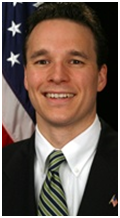
Deferred Examination: PTO to Hold Roundtable Discussion
It is clear that acting USPTO director John Doll has ideas for improving the patent system and that he is prepared to move the ball forward while he has the floor. Next on the order of business -- deferred examination. On February 12, 2009, the USPTO will hold a preliminary discussion on the potential for expanding the deferred examination system. Requests to participate should be sent to Robert Bahr (robert.bahr@uspto.gov). You may send comments to AC6comments@uspto.gov. Although attendance is open to the public, you must be pre-approved to 'participate.'
Bits and Bytes NO. 88
- New PTO Director: The USPTO will be closed on Monday and Tuesday (Jan. 19-20). When it reopens, John Doll will be the Acting Director of the USPTO. Doll is a career PTO official and already fully understands the system and the role of the PTO director. Because Doll has had considerable influence while working under Jon Dudas, we can expect that there will be few immediate or dramatic changes. In part because of the absence of a Commerce Secretary, I expect that Doll's tenure will likely last for several months.
- Secretary of Commerce: While on the topic, I heard this morning that John Thompson, CEO of Symantec may be named appointed as the next Secretary of Commerce. If appointed, Thompson may play an important role in some patentability disputes. Symantec has been directly involved in a number of patent litigation disputes – both as a plaintiff and as a defendant. Symantec is the assignee of hundreds of patents. I cannot say, however, whether Thompson feels scorned or empowered by the current patent system.
- Chief Judge Michel & Professor Lichtman: Professor Doug Lichtman has introduced his most recent guest on the "IP Colloquium" – Chief Judge Paul Michel of the Court of Appeals for the Federal Circuit. In an hour-long discussion, the pair discuss common deficiencies in appellate advocacy; the important value of amicus briefs at the rehearing stage; Section 101 post-Bilski; and the lost doctrine of equivalents. Professor Lichtman has configured the system so that you can also easily claim free CLE credit in California, Illinois, NY, Texas, or Washington State. Excellent work!
ABA Top Legal Blogs: For two years in a row, the ABA Journal has chosen Patently-O as one of the top 100 legal blogs. (Only 50 blogs made the cut both years). In addition, Patently-O has been honored in 2008 as the top legal blog focusing on a niche area of law. Thank you to everyone who voted during this process! In time for Patently-O's fifth anniversary in April, I expect that the website will record its ten-millionth visit in addition to the 16,000+ readers who receive their updates via the daily e-mail feed.
- Patent agent Brian Galvin has started a new blog, in a recent post, he discusses the BPAI's Cornea-Hasegan Opinion. His analogy is interesting: "[The current state] of statutory eligibility … reminds me of … Ptolemaic astronomy just before Galileo, Kepler and Copernicus. The more wheels we add, the more untenable the whole structure." [LINK]
Patent Term Adjustments Just Got Longer
Wyeth v. Dudas (D.D.C., Sept. 30, 2008).
PTO FEES
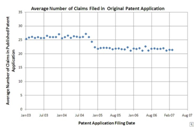
Taking Action Against the new Ex Parte Appeal Rules
On October 8, 2008, the PTO invited public comments on the potential paperwork burden caused by the new Ex parte Appeal Rules (73 Fed. Reg. 32937-32977, June 10, 2008).[Request for comment]. Economist Dr. Richard B. Belzer is working to push the Office of Management and Budget (OMB) to reject the rules – in part by arguing that they will be unduly burdensome. Any comments that come in response to this Information Collection Request (ICR) will be sent directly to the OMB.
Tafas v. Dudas: Appellate Briefs
Tafas v. Dudas (pending before the Federal Circuit)
Examination Query: Parallel Examination
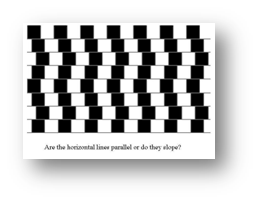
Cooper Techs: PTO’s Interpretation of “Original Application” Given Chevron Deference
Cooper Techs. v. Dudas (Fed. Cir. 2008)
Patently-O Bits and Bytes No. 57
New PTO Fees: Up 5% to account for inflation. [LINK]
- Patently-O Job site has a new media partner: the Inhouse Blog. The Inhouse blog has its own job board with inhouse jobs.
- Duffy Provision: Duffy expressed his "skeptic[ism] about the constitutionality of the retroactivity provision." [LINK]
- Speedo's torso-swimsuit patent is still pending. See http://www.pat2pdf.org/patents/pat20080141431.pdf.
PTO Revises Rules of Ethics and Professionalism
The USPTO has published its final rules implementing changes to its rules of discipline and professionalism that governing patent attorneys, patent agents and trademark attorneys.
PTO: Some Claim & Continuation Rules will Not be Effective Until After Injunction is Lifted
TAFAS v. DUDAS: PTO Asks CAFC To Allow Office to Implement Limits on Continuations and Claims
Tafas v. Dudas (on appeal at the CAFC)
Are these appeal timing estimates correct?
PTO Implements Final BPAI Appeal Rules
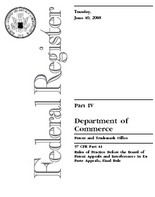
Patent Prosecution Timing for Recently Issued Patents
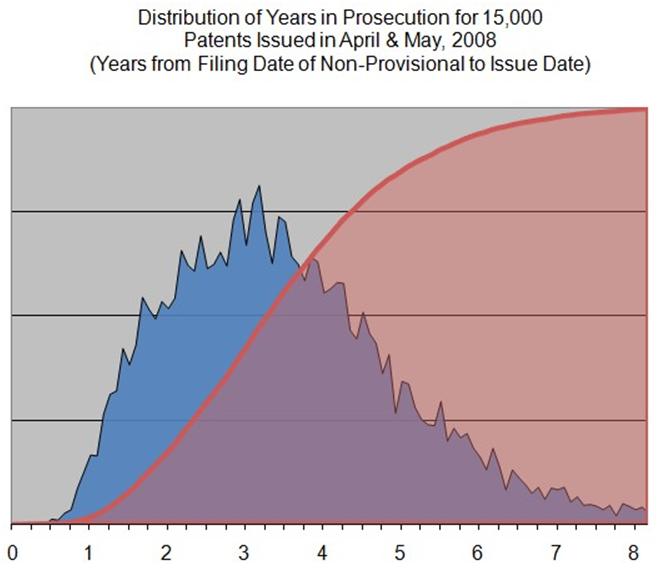
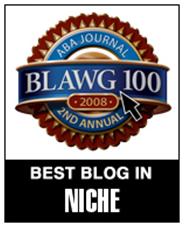 ABA Top Legal Blogs: For two years in a row, the ABA Journal has chosen Patently-O as one of the top 100 legal blogs. (Only 50 blogs made the cut both years). In addition, Patently-O has been honored in 2008 as the top legal blog focusing on a niche area of law. Thank you to everyone who voted during this process! In time for Patently-O's fifth anniversary in April, I expect that the website will record its ten-millionth visit in addition to the 16,000+ readers who receive their updates via the daily e-mail feed.
ABA Top Legal Blogs: For two years in a row, the ABA Journal has chosen Patently-O as one of the top 100 legal blogs. (Only 50 blogs made the cut both years). In addition, Patently-O has been honored in 2008 as the top legal blog focusing on a niche area of law. Thank you to everyone who voted during this process! In time for Patently-O's fifth anniversary in April, I expect that the website will record its ten-millionth visit in addition to the 16,000+ readers who receive their updates via the daily e-mail feed.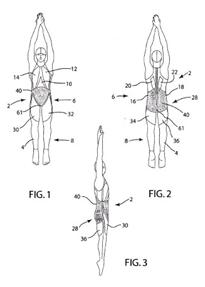 New PTO Fees: Up 5% to account for inflation. [
New PTO Fees: Up 5% to account for inflation. [
